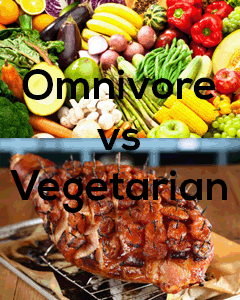Omnivore vs Vegetarian Diets for Sports Performance?
This is a question worth seriously considering if you are already following a diet free from animal products, specifically meat or are considering it; Diets like vegetarian or a derivative of, or vegan.
Now this is not about the moral decisions or which is better for the environment or animal cruelty etc. This is not the place for that. It’s not even about which is best for longevity as that is a rather contradictory can of worms.
It is certainly not about demonising either choice.
It is about maximising human performance in sports and getting the most from your time in the gym. It’s about knowledge.
The media would have us believe that veganism or other forms of vegetarian styled diets are the holy grail to health and vitality but if you consider strength to be the foundation of performance then they’d be wrong, according to the limited science I could find and years of anecdotal evidence.
The studies that have been performed are few and far between, which is surprising to me, but then perhaps researchers feel it doesn’t need looking into due to it’s seemingly obvious conclusion.
To the studies
The first was an observational cross section study that looked at muscle mass* differences between omnivores and vegetarians. There was no mention of any training status so lets assume they are non training participants:
http://journals.cambridge.org/action/displayAbstract?fromPage=online&aid=6852612&fileId=S0007114509991310
* muscle mass is arguably the most important factor in longevity, power, speed and injury resilience in sport and several studies show longer and better quality of life in those with more muscle mass than those with less
Meat eaters carried more muscle even where protein quantities are matched.
They concluded:
“animal protein intake (g/d) was the independent predictor of muscle mass….Thus, a vegetarian diet is associated with a lower muscle mass index than is an omnivorous diet at the same protein intake”
The second study looks at bone density (among other factors) of over 200 female vegetarians:
http://link.springer.com/article/10.1007/PL00005812
Bone density is incredibly important for health and also in sports too. Seemingly obvious is that bones tend to break less often when they are denser and stronger.
Tendons attach to bone so a strong attachment point is critical for optimum muscle performance and growth.
Osteoporosis is serious issue for all but more so for women as they age. Vegetarian and vegan diets without supplementation do not support healthy bones….
They concluded:
“Long-term practitioners of vegan vegetarian were found to be at a higher risk of exceeding lumbar spine fracture threshold ….and of being classified as having osteopenia of the femoral neck”
When I find more studies I will update appropriately.
This article and discussion does have some great points and is worth a read if you’re interested….remember that much of it is opinion not back by evidence while other sections are backed. It is long but interesting and thought provoking:
http://www.sportsci.org/jour/0201/cf-e.htm
Whilst two studies are not a mountain of evidence it certainly echoes my experience with hundreds of clients and with the experiences of the vast majority of high level athletes that need strength, power, speed and muscle mass.
If you have any questions, experiences or thoughts on Omnivore vs Vegetarian Diets then feel free to share them!
Your Epsom and Surrey Personal Trainer,
Richard Ham Williams

